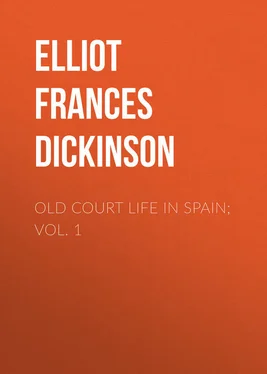Frances Elliot - Old Court Life in Spain; vol. 1
Здесь есть возможность читать онлайн «Frances Elliot - Old Court Life in Spain; vol. 1» — ознакомительный отрывок электронной книги совершенно бесплатно, а после прочтения отрывка купить полную версию. В некоторых случаях можно слушать аудио, скачать через торрент в формате fb2 и присутствует краткое содержание. Жанр: foreign_antique, foreign_prose, на английском языке. Описание произведения, (предисловие) а так же отзывы посетителей доступны на портале библиотеки ЛибКат.
- Название:Old Court Life in Spain; vol. 1
- Автор:
- Жанр:
- Год:неизвестен
- ISBN:нет данных
- Рейтинг книги:4 / 5. Голосов: 1
-
Избранное:Добавить в избранное
- Отзывы:
-
Ваша оценка:
- 80
- 1
- 2
- 3
- 4
- 5
Old Court Life in Spain; vol. 1: краткое содержание, описание и аннотация
Предлагаем к чтению аннотацию, описание, краткое содержание или предисловие (зависит от того, что написал сам автор книги «Old Court Life in Spain; vol. 1»). Если вы не нашли необходимую информацию о книге — напишите в комментариях, мы постараемся отыскать её.
Old Court Life in Spain; vol. 1 — читать онлайн ознакомительный отрывок
Ниже представлен текст книги, разбитый по страницам. Система сохранения места последней прочитанной страницы, позволяет с удобством читать онлайн бесплатно книгу «Old Court Life in Spain; vol. 1», без необходимости каждый раз заново искать на чём Вы остановились. Поставьте закладку, и сможете в любой момент перейти на страницу, на которой закончили чтение.
Интервал:
Закладка:
“Come to me,” he says, in a soft voice, as he bends on her his glowing eyes. “Come without fear. Let no sorrow cloud that royal brow. Beside me, your path shall ever be made smooth, and a shelter found, where you shall rest alone. As in the court of your father, so shall you be in mine. All I crave is leave to kiss your feet, most incomparable stranger. This favour you will not refuse.”
At which Egilona, blushing to the painted henna circles which increased the splendour of her eyes under his ardent gaze, bows her dark head.
Then taking her hand, Roderich, kissing the delicate finger-tips tenderly, forbade her to kneel before him as she desired. With his own hands he mounted her on a palfrey, and accompanied her up the ascent to the castle, where he installed her in the richest chambers facing the sun. And, ever more and more enslaved, the handsome young Goth, amorous by temperament and habit, became dearer and dearer to her, and fainter and fainter grew the remembrance of her African home, and that Tunisian bridegroom she had never seen; until, at last, her dainty lips opened with a “Yes,” to his entreaties, and Egilona consented to become a Christian and his queen.
Wonderful are the ways of love! All this took place in a brief space. Not only Egilona, but many of her Moorish damsels, wooed by Gothic knights, eloquent with the words of passion, found their arguments so convincing, that they also not only shared in her conversion, but followed her example in marriage.
Happy Egilona! The shops in the Yacatin, the Jews’ quarter, and the bales of the African merchants travelling from city to city, were ransacked for her use. The most precious merchandise, silks, gems, perfumes, and sweetmeats – all that Europe and the East possessed richest and rarest to please a lady’s eye – were showered upon her, when Don Roderich led her by the broad marble stairs of the Alcazar into the pillared patio , followed by her African retinue, down the steep streets to the Cathedral – very different to what we see it now, though standing on the same spot, and in all ages a fair and stately edifice, said to have been founded by the Virgin herself. Children, according to ancient custom, ran before to throw flowers in her path; and bowls filled with uncut jewels and gold coins were presented to her by noble youths in silken robes. The wedding chorus was sung as she passed by, a poet reciting “How the god of love had wounded the heart of the king,” the Archbishop Opas himself meeting them at the great Puerta, and blessing them as they knelt.
Jousts, tournaments and banquets, followed; the great chiefs appearing resplendent in burnished armour, embossed and enamelled in the ancient style; nothing was too costly for these delicate descendants of the rudely armed Alaric; carpet knights, all plumes and banners and worked scarfs, glittering in and out of silken tents; and revelry and dances presided over by the king and queen.
For twenty days princes and knights, assembled from all parts of Spain, kept holiday at Toledo. Every tongue declared the dark-skinned Egilona peerless among queens, and Don Roderich the comeliest of the Gothic race. Egilona was adored by her Christian consort. He turned no more longing eyes upon the venal fair who hitherto had contended for his favour, and the vessel of state glided over a crystal sea to the soft winds of prosperity under a cloudless sky.
The old lays and ballads make Roderich, in the magnificence of his youth, a rival of the Cid Campeador himself. Even his mortal enemies, the Moors, glorify him in their songs sung to the cither under the orange groves of Granada.
But already the “cloud no bigger than a man’s hand” is rising on the horizon, by-and-by to obscure and darken the sun of his success.
A crown acquired by violence sits uneasily on the usurper’s head. Like Witica, Don Roderich was tormented with suspicions of conspiracies and treachery among his powerful nobles. So little did the fate of his ill-starred predecessor teach him wisdom, that he permitted the same fears to haunt him, of all who were allied to him by blood. Witica’s two sons were banished from Spain, and, to avoid the chance of rebellion, such defences in walls and castles as yet remained were thrown down, and the carefully constructed fortifications of the Romans levelled to the earth. Nor could a rude and warlike race be expected to maintain their early valour in the midst of such luxury and licentiousness as prevailed. For two hundred years the Gothic kings had held Spain by the prowess of their arms, and the simple habits of their forefathers – Ataulfo, Sigeric, Theodoric, Alaric, Amalaric, and his successors up to the frugal-minded Wamba, the “Farmer King.”
Now, under Witica and Roderich, effeminacy and sloth led on to cowardice. The Gothic soldiers who had been galvanised into a temporary show of valour by the recent strife between Witica and Roderich, soon sank back into the inactivity of a wanton court, feasting, dancing, and wassailing in a style more becoming the satraps of an Eastern potentate than the chiefs of a free and generous people. Who could have recognised in these voluptuous youths, who hung about the person of Don Roderich, the descendants of those stern and frugal Teutonic heroes of the North, marching down like thunder-gods to conquer the nations?
Pomp there was, it is true, and splendour, and civilisation, and an elegance of manners and of thought unknown before; but the heart of the Gothic nation was cankered at the core, and the warlike Moors, ever on the lookout to snatch from their grasp the fertile Peninsula showing out so fair across the Straits, noted it with joy.
CHAPTER II
Don Roderich – Gathering of the Chiefs – Trial of Witica
HOW strange to think of Cordoba before the Moors, who so imbued it with the spirit of Moslem life! Those famous Caliphs of the rival houses of Mirvan and Ummaija, and the great Abdurraman, whose wealth and luxury read like a dream; Eastern luxury in banquets under painted domes; odalisques and white-robed eunuchs gliding beneath fretted arches, vaults of alabaster and porphyry; harems with walls shedding showers of jasmine and rose-leaves, the soft breathings of guzla and cither, dark heads crowned with orient pearls, and tissue-robed Sultanas reclining on golden thrones.
“Kartuba the important,” the gem of the Carthaginians, – ancient when the Gentiles reigned in the time of Moses; possessed in turn by Greeks and Romans, the birthplace of Seneca, Lucan, Averroës, and El Gran Capitan Gonsalvo Aguilar de Cordoba; for ages the capital of Southern Spain, – is to be considered exclusively, before the advent of the Moors, as a Roman settlement, the grandly regular aspect of these masters of the world impressed upon its buildings. Siding with Pompey in the time of the Republic, it was destroyed by the vengeance of Cæsar. Rebuilt by Marcellus and repeopled by penniless patricians from Rome, it was for a time called “Patricia”; under all names a sober and dignified capital gathered round its ancient castle on the banks of the Guadalquivir.
At all times Cordoba is beautiful; the verdant slopes of the Sierra Morena, rising precipitously from the very gates, look down serenely on the strife of rival peoples; lovely retreats, dotted with white quintas , farms, mills, vineyards, and olive-grounds; the rugged summits rising westwards to the limits of Lusitania; the lazy Guadalquivir flowing at their base, through grassy plains dark with orange and myrtle.
Now what a desolation! A solitary shepherd pipes to his flock, as he passes at the Ave Maria , on the lonely road; a file of mules carrying bricks or corn succeed him; a ragged goatherd watches his kids grazing beside the river, and droves of swine burrow in the mould once trodden by the steps of heroes! Two boldly crenelated towers and a portion of the outer walls, rising from an ancient garden of exceeding sweetness, are all that remains of the palace and fortress of the Gothic kings. Thickets of roses and lilacs engulf you as you enter, broad palm leaves shroud decay, and quivering cane-brakes whisper softly of the past. A little to the left rises a lower tower, grey against the sky, another and another, the stones scarcely held together by entwining ropes of ivy – all that remains of the royal castle.
Читать дальшеИнтервал:
Закладка:
Похожие книги на «Old Court Life in Spain; vol. 1»
Представляем Вашему вниманию похожие книги на «Old Court Life in Spain; vol. 1» списком для выбора. Мы отобрали схожую по названию и смыслу литературу в надежде предоставить читателям больше вариантов отыскать новые, интересные, ещё непрочитанные произведения.
Обсуждение, отзывы о книге «Old Court Life in Spain; vol. 1» и просто собственные мнения читателей. Оставьте ваши комментарии, напишите, что Вы думаете о произведении, его смысле или главных героях. Укажите что конкретно понравилось, а что нет, и почему Вы так считаете.












